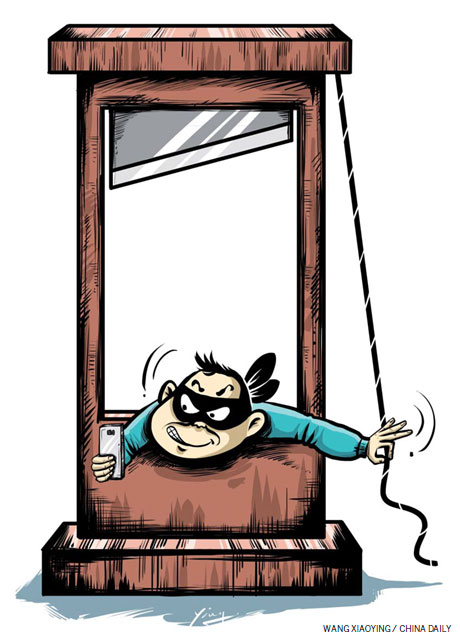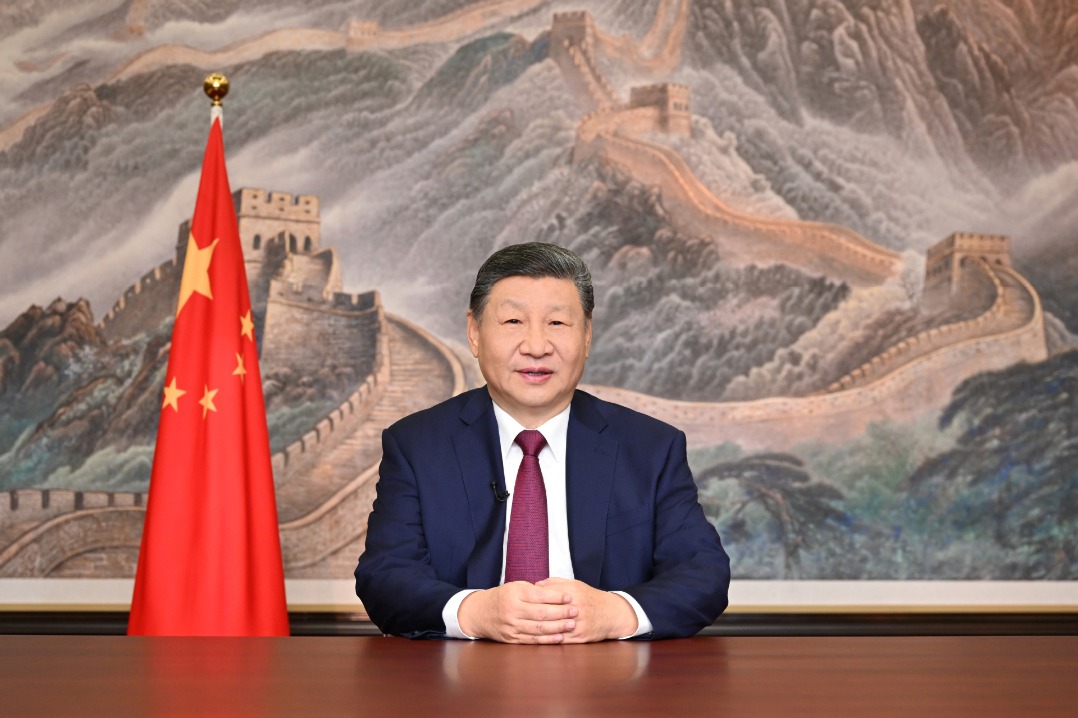Selfies and the art of staying within limits


Pictures can incite actions as the ability to instantly broadcast one's image pushes boundaries of what is ethically or legally acceptable
Security cameras at public spaces are increasingly helping law enforcement officers in identifying criminals in the act of committing crimes, but it gains an ironic twist when photos of wrongdoings are taken and made public by the perpetrators themselves.
On August 23, a driver in Xuzhou, Jiangsu province, blogged about his "first time drunk driving", saying a policeman friend had escorted him safely home. As if to verify his claim, he uploaded a photo of beers and food in the vehicle. As netizens were shocked and went looking for his real identity, he deleted the blog and said he was just joking. Xuzhou police said they were investigating.

A few months ago, a bank manager in Shenzhen, Guangdong province, went one step further. He not only uploaded a selfie of drunk driving to his microblog, but alerted police to it. After the online public uncovered a dozen more of his traffic violations, he turned himself in, saying it was stupid of him to challenge the police.
Among the most notorious recent selfies was one by a man named Chen Haisheng - a bloody picture of him slaughtering a wild donkey in the Tibetan wilderness. He was obviously very proud of his feat as was shown in full pose. After he was arrested for killing the endangered animal, he said he used his vehicle to run it down and then gouged out its intestines. He gave the meat to fellow workers at a power company, he said. Chen awaits trial.
The convenience of selfies enabled by technology is giving people a new platform for self-expression. While most people use digital gadgets to capture themselves enjoying beautiful scenery or delicious food, others want to share their moments of adventure. Adventure is a common thread in the above three cases.
Not all photo takers or uploaders may be aware of the legal ramification of their actions, such as the animal abuser who might not know the wild donkey is protected by law. But knowing it was illegal may have exhilarated them rather than stopped them from carrying out what they were doing.
A public campaign to crack down on drunk driving has been in place across China for years now. Assuming the protagonists in the first two incidents were not joking, they could have been emboldened by alcohol into a temporary spasm of bravado. Even if they were not driving but drunk, it could still be the effect of intoxication that they willingly subjected themselves to the prying eyes of the police and prosecutors.
At parties people say things they may not dare say while sober, and some may even go out and do it. To a less extent and perhaps to a limited crowd, selfies seem to have a similar effect. The ability not only to let the world know, but to show the world, that you are capable of something is simply irresistible. It heightens the pleasure one derives from carrying out a dangerous act.

Of course, there are perfectly legal acts that give vent to such a desire. Bungee jumping is one, and operators of such a business usually videotape the process and sell the disk to you at a huge markup, knowing that you will probably value the proof of the act as much as the act itself. But at the other end of the legal spectrum, you will see egregious acts caught and distributed by the perpetrators. Gruesome war-time atrocities come to mind. Were these people proud because they believed the photographers were capturing their moments of glory? Even though the photos were taken by someone around them, they had an intimacy of selfies and showed the side of them that they wanted to project.
There could be an element of bragging in it. In one of the opening stories, the drunk driver was boasting of two things: his ability to drive while inebriated and his protective cover of the law. Of course, if he was telling the truth, his policeman friend would have violated his procedure and possibly the law. In nature, his claim was not that different from the one who, a few years ago when caught in a hit and run accident, said his father was the local police chief. Now, just imagine the young man left not only the infamous saying "My dad is Li Gang" but also backed it up with a self-taken photo of the scene he was fleeing. That would have added so much fuel to the fire.
The ability to show off one's power, wealth or connections tends to cloud some people's judgment about right and wrong. A couple of years ago, a pop singer tweeted about an incident in which she forgot about a piece of costume for a concert and the local police blocked the traffic so that a special car could be sent to fetch it in the shortest possible time. Obviously she meant it as a sign of her stature, but the public denounced it as an abuse of police power committed in her name or at her persuasion. Most of them deemed the fetching of her costume not worth the inconvenience to so many people. She later apologized.
Just as language is a skill that one must study to master, the selfie in its current state of ubiquity is also a skill of expression that one has to hone. Most people would not break the law to create pictorial proof of their daring, but it is quite common to commit faux pas in decorum. Celebrities like Yao Chen and Zhang Ziyi seem to be positive role models, always saying the right things and posting the right photos. Others seem to be carried away and are dangerously close to trespassing into the realm of impropriety.
Another gray area is the public-private sphere, where the line of demarcation is getting thinner and even evaporating. When you post a selfie to your WeChat account, you may be convinced it is for your circle of friends, but it can quickly spread to those who don't know you and will now judge you by this image, often out of context. People are more willing to trust a photo than a text description because we all believe in the saying "An image is worth a thousand words", but images, even those not doctored, can be misleading.
While I encourage others to use rules of propriety while posting selfies, I honestly do not know what to say to those shooting themselves in the act of doing something outrageous. To discourage photo-taking and sharing without opposing drunk driving or abusing animals would be hypocritical. One needs to be morally grounded to guard against the impulse for placing others in harm's way.
But these are the easy choices. What if the act is controversial? For example, some Chinese high schools forbid dating. If a student posted a selfie of himself sharing a kiss with a fellow student and was expelled, my first response could be "Why did you have to upload it?" understanding full well the rationale of both sides - the students in the sweetness of puppy love and the school authority in the desperation for total commitment to test scores.
The writer is editor-at-large of China Daily. Contact him at raymondzhou@chinadaily.com.cn
(China Daily Africa Weekly 08/29/2014 page30)
Today's Top News
- Confidence, resolve mark China's New Year outlook: China Daily editorial
- Key quotes from President Xi's 2026 New Year Address
- Full text: Chinese President Xi Jinping's 2026 New Year message
- Poll findings indicate Taiwan people's 'strong dissatisfaction' with DPP authorities
- Xi emphasizes strong start for 15th Five-Year Plan period
- PLA drills a stern warning to 'Taiwan independence' separatist forces, external interference: spokesperson






























